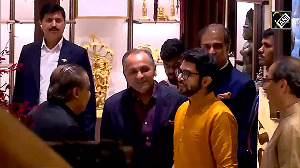'How can middlemen disappear as long as our political parties are sucking in massive amounts of black money?'
'There is an old political art well practised in New Delhi -- people create artificial problems and then solve it for you to earn your gratitude for a lifetime.'
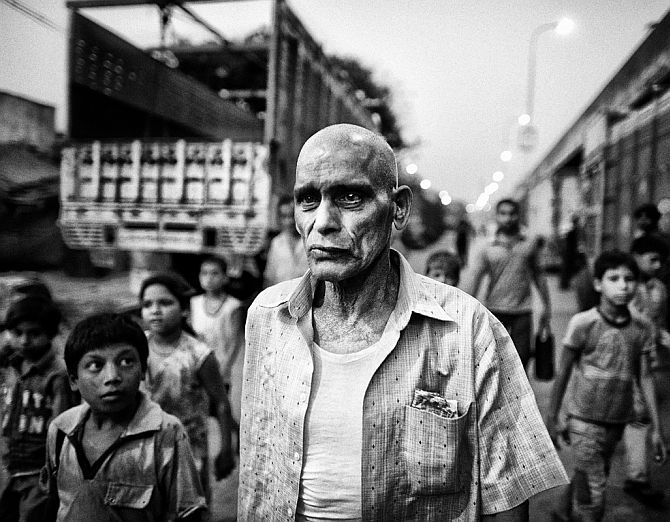
Investigating scams have been award-winning journalist Josy Joseph's specialty.
Currently the national security editor at The Hindu and a former Rediff.com correspondent, Joseph is passionate about exposing corruption and takes a hard look at the real beneficiaries of India's corrupt, crumbling system of governance in his book A Feast Of Vultures: The Hidden Business Of Democracy In India.
In an email interview with Rediff.com's Syed Firdaus Ashraf, he explains how his book exposes the politician-corporate nexus in India and why he hopes it will be a record of contemporary India's history.
As a journalist, you have exposed scams like Adarsh and the naval war room leak. You have also written about the Commonwealth Games scam and the 2G spectrum allocation scam. So why did you feel the urge to write A Feast Of Vultures?
As reporters, we are always dealing with a tiny bit of a large puzzle. We are also hamstrung by space limitations, various kinds of censorships imposed by corporate, political and such interests as well as other restrictions.
I wanted to report and interpret modern India without any self-censorship, varnishing or any other considerations.
A Feast Of Vultures is my first step in this direction.

After reading your book, one gets the impression that India's natural resources are like a feast and corporate groups, in cahoots with politicians, have looted the country like vultures.
Can you tell us how this culture of looting developed in India post Independence?
It is not just the politicians or the corporates, but all of us, the Indian elite, who have conspired to loot not just the natural resources, but all the available resources of this democratic Republic.
The result is the horrifying reality that the world's largest democracy, which has been boasting of impressive economic growth for a quarter of a century, houses the globe's largest population of malnourished children, illiterates, people without bathrooms.
Ordinary people live in mortal fear amidst institutions that are deeply corrupt, misogynistic and insensitive.
The British structures that were inherited by the new democracy were mere colonial vestiges to rule a country top-down, so we see huge black holes of governance at the bottom of the pyramid.
We should have built our democracy bottom-up, but we are exploiting the top-down structures that we inherited to perpetuate an appalling model of democracy that is only aiding a small group of elite to flourish.
Liberalisation did not much to alter it. It was again a top-down effort. This status quo will only ruin the world's greatest experiment in democracy -- change is imperative.
Since you have worked on so many stories involving scams, can you tell us why we have not seen any big political leader in jail for a long duration till date?
Where has the system failed?
In a long term framework, probably Indian democracy is maturing. And we have seen a fair number of senior political leaders and civil servants going to jail.
However, many of them, as accused, were taken into custody to cool off public anger; rarely have they been convicted in a crime and sent to jail for the long term.
It is a fact that our judiciary has an inconsistent track record when it comes to quick convictions, the trial of the rich and famous and in dispersal of justice to the poorest.
Actually, the poorest in this country do not come to our courts, they settle for whatever justice, or injustice, local kangaroo courts, political thugs and a corrupt police disperse.
For all its glorious achievements, the Indian judiciary is yet not fully democratised and localised. Above all, access to it is very expensive.
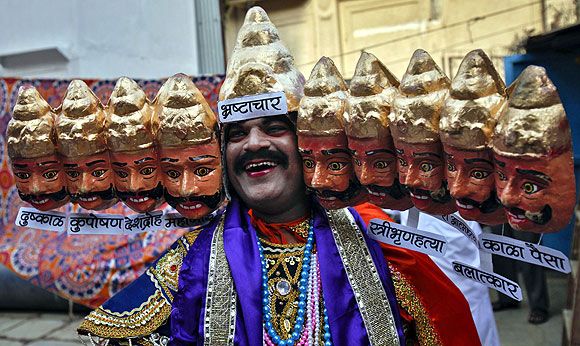
You mention three typists-cum-secretaries in your book: M O Mathai (who worked for Jawaharlal Nehru), R K Dhawan (who worked for Indira Gandhi) and Vincent George (who worked for Rajiv Gandhi).
Did the Nehru-Gandhi family create a culture of sycophancy for wannabe industrialists for whom the norm was, 'If you have access to them, business success was guaranteed'?
Of course, the dominance of the Nehru clan has dramatically, and mostly adversely, affected the democratisation of this country.
The way they chose to exercise power, through a select coterie and in an extremely undemocratic fashion, has empowered those few typists, members of their coterie, and assured industrialists that access to the Gandhis -- an approving glance from them in a crowd, a mere mention of their first name by a member of the Gandhi household -- were all-powerful access tools to flourish and succeed in modern India.
India migrated from colonial rule to a quasi-feudal set-up. Democratic elections were justifications for perpetuating this feudal set-up, both at the Centre and at the state levels.
Look at any state -- there is a political family, or a few families, who actually control the reign of power.
Do you believe that under Narendra Modi's rule the middleman culture has disappeared and transparency has become a reality for business houses?
Of course not! That is the perception created by a propagandist government that is more obsessed with image and media than governance.
How can middlemen disappear and transparency appear as long as our political parties are sucking in massive amounts of black money?
You must hang around New Delhi for a few days to easily pick up whispers about new middlemen, new agents.
You mention that the Bofors scam cost Rs 64 crore (Rs 640 million) and, by the end of the investigation, the CBI spent Rs 250 crore (Rs 2.5 billion) to investigate it.
Does no one in the government ask for accountability from the CBI on the money it spends?
Among all forms of accountability, the most (in)efficient is parliamentary oversight with all its weaknesses because there is no other forum that is diverse enough and representative of India.
There is not a single segment of Indian public life that is (not) governed by unwavering oversight, especially from Parliament.
Look at all our regulatory bodies -- many of them are mere shams.
The CBI will keep opening preliminary enquiries and close them; they will register FIRs and keep dragging investigations and finally claim no evidence -- there is enough evidence in recent times that some of it is being done for a payment.
The situation actually gets worse with the Indian intelligence services.
The Indian security establishment, including the investigating agencies, are in an urgent need of a trip to the dry cleaner.
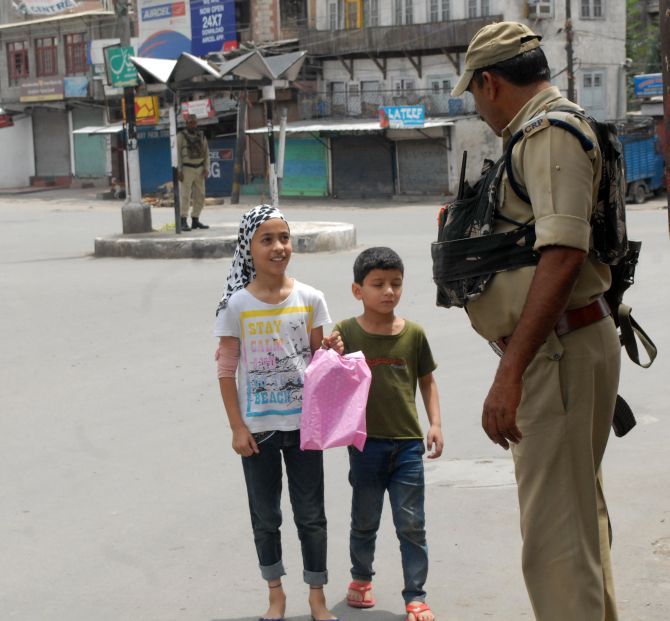
Speaking about insurgency, you say in the book that the mainstream media and security analysts have worked to create an ill-informed, often abusive and intolerant discourse.
What is their interest according to you in keeping public ill-informed?
There is an old political art well practised in New Delhi -- people create artificial problems and then solve it for you to earn your gratitude for a lifetime.
Something similar is visible in many governance and media discourses today. They will create fake problems, solve it with jingoistic flavour and earn applause.
Tired of applauding television commentators and experts and leaders dishing out complex arguments, we go to sleep, only to rise the next morning for another day of this incoherent circus.
There are many motives for most of the mainstream media to keep their countrymen ill-informed.
If you scientifically analyse Kashmir, the blame for the present flare-up might land at the doorstep of the present day government. But how many media owners want to take on a government today?
If you analyse the oligarchy-isation of politics, the blame will significantly lie with the Congress. But then, how will you manage glib-talking young Congress leaders in your studios?
So the twisted solution is when Kashmir flares up, we talk about Balochistan.
It is not possible to do such laughable circuses with patience and among learned people. So assemble a group of people whose only credibility is talking in high decibels, spitting hatred and saliva in equal quantity.
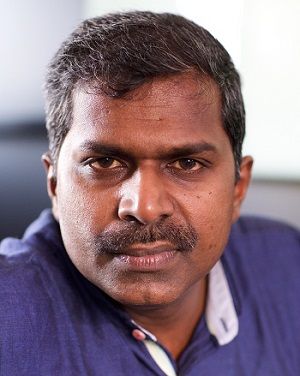 You (Josy Joseph, left) have been harsh on mining companies. Don't you think they are creating jobs whereas you argue that they are destroying India's environment and natural resources?
You (Josy Joseph, left) have been harsh on mining companies. Don't you think they are creating jobs whereas you argue that they are destroying India's environment and natural resources?
I am all for laissez faire capitalism, but it has to be practised responsibly and with great moral commitment.
There are enough examples of such responsible free markets across the world.
I have only been harsh about mining companies that are capricious, irresponsible and insensitive to their surroundings.
We can create jobs and economic growth without ruining ourselves.
The Modi government is giving NGOs a difficult time. Do you think its strategy is to target NGOs so that they do not obstruct the mining related work of big corporate groups?
The buzz in New Delhi about the government is that it is vigorously against transparency, and has an aura of autocracy around it, so we wouldn't really know the specific reasons behind its aggression against NGOs.
Much of the adverse image of the Modi government could be ill-founded propaganda against it.
The way it has been going after NGOs will dramatically backfire on it. I think there is need for the government to be more magnanimous than vindictive.
It is not just NGOs operating in (the) mining (sector); (NGOs) in (other) sectors have been facing the ire of the government (as well).
Your book talks about how politicians are using the State's muscle power to target the poor tribal population in the name of development.
In this scenario, do you foresee a future where only the courts can save democracy?
No single arm of governance can save democracy. I think India will move into a more equitable and fairer future in the wake of a massive youth movement, which is brewing across the country.
How it will play out is to be seen but, at the end of it all, we might have a better democracy, a better India.
- You can buy a copy of Josy Joseph's A Feast Of Vultures here.










